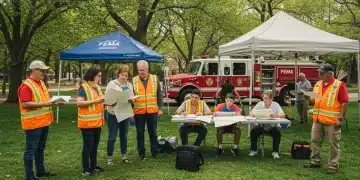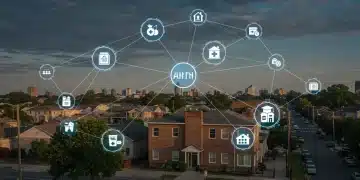Community Resource Training Programs: Skills and Knowledge for You

Community resource training programs equip individuals with essential skills and knowledge, fostering self-sufficiency, community engagement, and access to vital support networks.
Are you looking to enhance your skills and knowledge to better support yourself and your community? Community resource training programs offer a vital pathway to personal and collective empowerment, providing access to valuable resources and opportunities for growth.
Understanding Community Resource Training Programs
Community resource training programs play a crucial role in bridging the gap between individuals and the resources they need to thrive. These programs are designed to empower residents with the skills, knowledge, and connections necessary to navigate various challenges and contribute positively to their neighborhoods.
By participating in these initiatives, individuals can unlock new opportunities for personal and professional development, leading to improved quality of life and stronger, more resilient communities.
The Purpose of Community Resource Training
The core aim of these training programs is to enhance the capacity of individuals and communities to address local needs effectively. They provide practical skills and knowledge, promoting self-sufficiency and fostering a sense of ownership over community well-being.
Who Benefits from These Programs?
A wide range of individuals can benefit, including job seekers, parents, small business owners, and anyone looking to improve their skills and access local resources. These programs are often tailored to meet the specific needs of diverse populations within a community.
- Enhance job prospects and career advancement.
- Improve financial literacy and household management skills.
- Foster stronger family relationships and parenting abilities.
- Promote civic engagement and community leadership.
In conclusion, community resource training programs are essential for building stronger, more resilient communities by providing individuals with the tools and knowledge they need to thrive.
Identifying Available Training Programs
Finding the right community resource training program can be a game-changer. Knowing where to look and how to assess program quality is essential to ensure you invest your time and energy wisely.
This section will guide you through the process of identifying suitable training programs and evaluating their potential impact on your personal and professional growth.

Online Search Strategies
The internet is a powerful tool for discovering local training programs. Use specific keywords like “community resource training [your city/county]” to narrow your search and find relevant opportunities.
Local Community Centers and Libraries
Community centers and libraries are often hubs for information on local resources, including training programs. Check their websites or visit them in person to learn about available opportunities.
- Check local government websites for listings of community services.
- Contact community organizations and non-profits in your area.
- Attend community events and workshops to network and gather information.
In short, by employing effective search strategies and leveraging local resources, you can uncover a wealth of community resource training programs tailored to your needs and interests.
Types of Skills Developed Through Training
Community resource training programs cover a broad spectrum of skills, catering to diverse needs and interests. These skills can range from practical job-related abilities to essential life skills that empower individuals to navigate everyday challenges.
This section explores some of the key skills developed through these programs and their potential impact on personal and community development.
Job Skills and Career Development
Many programs focus on providing job-specific skills training, resume writing assistance, and interview coaching to help individuals secure employment and advance their careers.
Financial Literacy and Management
These programs equip individuals with the knowledge and skills to manage their finances effectively, including budgeting, saving, and debt reduction strategies.

- Improve communication and interpersonal skills.
- Enhance problem-solving and critical-thinking abilities.
- Develop leadership skills and community engagement strategies.
In conclusion, the skills developed through community resource training programs are diverse and valuable, contributing to personal growth, career advancement, and stronger, more resilient communities.
The Impact of Training on Community Engagement
Community resource training programs not only benefit individuals but also contribute significantly to community engagement and development. By empowering residents with skills and knowledge, these programs foster a sense of ownership and collective responsibility.
This section explores the various ways in which training initiatives can promote civic participation, volunteerism, and collaborative problem-solving within communities.
Promoting Civic Participation
Training programs can educate individuals about local government processes, encourage voter registration, and promote participation in community decision-making.
Encouraging Volunteerism
By providing training in specific areas, such as event planning or fundraising, these programs can equip individuals to become effective volunteers and contribute meaningfully to local organizations.
- Creating stronger social connections and networks.
- Fostering a sense of belonging and shared purpose.
- Building trust and collaboration among residents.
To summarize, community resource training programs play a vital role in fostering community engagement by empowering residents with the skills, knowledge, and connections they need to actively participate in building stronger, more vibrant neighborhoods.
Overcoming Barriers to Participation
While the benefits of community resource training programs are clear, various barriers can hinder participation. These barriers can include financial constraints, lack of transportation, childcare challenges, and language difficulties.
This section explores some of the common obstacles to participation and highlights strategies for overcoming them, ensuring that these valuable programs are accessible to all members of the community.
Financial Assistance and Scholarships
Many programs offer financial assistance or scholarships to help cover the cost of training, making it more accessible to low-income individuals.
Transportation Solutions
Offering transportation assistance, such as bus passes or carpooling programs, can help overcome transportation barriers and encourage greater participation.
- Providing childcare services during training sessions.
- Offering flexible scheduling options to accommodate work and family obligations.
- Translating materials and providing interpretation services for non-native speakers.
In conclusion, by addressing these barriers proactively, communities can ensure that community resource training programs are accessible to all residents, regardless of their circumstances, promoting equity and fostering a more inclusive environment.
Measuring the Success of Training Programs
Evaluating the effectiveness of community resource training programs is crucial to ensure they are achieving their intended goals and delivering value to participants and the community. This involves collecting data and tracking outcomes to assess the impact of the training initiatives.
This section explores various methods for measuring the success of training programs, including participant feedback, skill assessments, and community-level indicators.
Participant Feedback and Satisfaction Surveys
Gathering feedback from participants through surveys and interviews can provide valuable insights into their experiences and the perceived impact of the training.
Skill Assessments and Performance Evaluations
Conducting skill assessments before and after training can help measure the knowledge gained and skills developed by participants.
- Tracking employment rates and wage increases among participants.
- Monitoring community-level indicators, such as crime rates and volunteerism levels.
- Conducting cost-benefit analyses to assess the economic impact of training programs.
To sum up, by employing a comprehensive approach to evaluation, communities can gain a clear understanding of the impact of community resource training programs and make data-driven decisions to improve their effectiveness and maximize their value.
| Key Point | Brief Description |
|---|---|
| 📚 Skill Development | Training programs enhance job skills and financial literacy. |
| 🤝 Community Engagement | Programs promote civic participation and volunteerism. |
| 🚧 Overcoming Barriers | Assistance available to address financial and logistical challenges. |
| 📊 Measuring Success | Evaluation includes participant feedback and skill assessments. |
Frequently Asked Questions
▼
These programs provide individuals with skills and knowledge to improve their lives and communities, covering topics like job training, financial literacy, and civic engagement.
▼
Job seekers, parents, small business owners, and anyone looking to improve their skills and access local resources can benefit from these programs.
▼
Check local government websites, community centers, libraries, and community organizations for listings of training programs and resources.
▼
Common barriers include financial constraints, lack of transportation, and childcare challenges, but many programs offer assistance to overcome these.
▼
Success is measured through participant feedback, skill assessments, and community-level indicators such as employment rates and volunteerism levels.
Conclusion
Community resource training programs are indispensable tools for individual and community empowerment. By providing access to vital skills and knowledge, these programs foster self-sufficiency, promote civic engagement, and build stronger, more resilient communities. Embracing these training opportunities can unlock new possibilities and contribute to a brighter future for us all.





